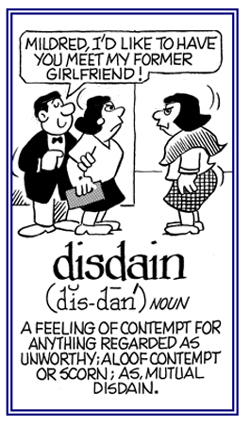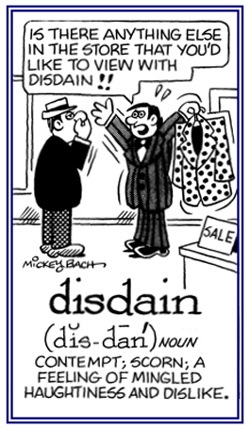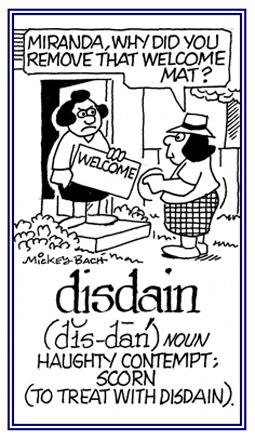dis-, di-, dif-
(Latin: separation, apart, asunder; removal, away, from; negation, deprivation, undoing, reversal, utterly, completely; in different directions)
The meaning of dis- varies with different words; dif-, assimilated form of dis- before f; di-, form of dis- before b, d, g, l, m, n, r, and v.
1. A talk between two or more people about a subject, usually to exchange ideas or to reach a conclusion, or any talk of this kind: Just as Susan entered the kitchen, she overheard her parents having a discussion, or conversation, about where to spend their next holiday.
2. A detailed consideration or examination of a topic in writing or speech: There was a discourse or discussion in a magazine article about the best and healthiest method to lose weight.
2. A detailed consideration or examination of a topic in writing or speech: There was a discourse or discussion in a magazine article about the best and healthiest method to lose weight.
discutient
1. Serving to disperse morbid matter; discussive; as, a discutient application.
2. An agent (as a medicinal application) which serves to disperse morbid matter.
2. An agent (as a medicinal application) which serves to disperse morbid matter.
1. A strong disapproval or dislike of someone or something which is considered undeserving of respect: The mayor regarded the proposal for building a shopping center in the city park with disdain.
2. Etymology: from Middle English from Old French desdeign, desdeignier; based on Latin dedignari from de-, "reversal" + dignari, "to consider worthy" from dignus,"worthy, deserving recognition".

© ALL rights are reserved.

© ALL rights are reserved.

© ALL rights are reserved.
Go to this Word A Day Revisited Index
2. Etymology: from Middle English from Old French desdeign, desdeignier; based on Latin dedignari from de-, "reversal" + dignari, "to consider worthy" from dignus,"worthy, deserving recognition".



Go to this Word A Day Revisited Index
so you can see more of Mickey Bach's cartoons.
disdainful (adjective), more disdainful, most disdainful
Conveying a strong hatred for a person, or something, that is thought does not deserve respect: "When Janine was at the restaurant, she looked at the plate which the waiter brought with a disdainful glare because it was not what she had ordered."
disdainfully (adverb), more disdainfully, most disdainfully
A reference to a person who has a strong disapproval or dislike for something, or someone, who is regarded as not deserving respect: "The artist disdainfully reacted when someone criticized his work at the exhibition."
disenchant (verb), disenchants; disenchanted; disenchanting
1. To make someone stop believing that something, or somebody, is worthwhile, right, or deserving of support.
2. To free someone from a belief: "Joe was disenchanted from the magic spell when he realized how it was a trick and not a real situation."
3. To rid of, or to free from, enchantment, illusion, credulity, etc.
4. Etymology: from about 1586, from Middle French (language as written and spoken about 1400 to 1600) desenchanter, from des-, "dis-" + enchanter, "to enchant" (from Middle English enchanten, from Old French enchanter, from Latin incantre, "to utter an incantation, to cast a spell", from en-, in-, "against" + cantre, "to sing".
2. To free someone from a belief: "Joe was disenchanted from the magic spell when he realized how it was a trick and not a real situation."
3. To rid of, or to free from, enchantment, illusion, credulity, etc.
4. Etymology: from about 1586, from Middle French (language as written and spoken about 1400 to 1600) desenchanter, from des-, "dis-" + enchanter, "to enchant" (from Middle English enchanten, from Old French enchanter, from Latin incantre, "to utter an incantation, to cast a spell", from en-, in-, "against" + cantre, "to sing".
1. A feeling of disappointment regarding someone or something that was previously admired, respected, or believed: "Many members of the political group have a growing disenchantment with the leadership."
2. Etymology: from obsolete French desenchanter, from Old French, "to break a spell" from des-, dis-, "apart, away from" + enchanter, "to enchant" or "to put a magic spell upon".
2. Etymology: from obsolete French desenchanter, from Old French, "to break a spell" from des-, dis-, "apart, away from" + enchanter, "to enchant" or "to put a magic spell upon".
disenvenom
To undo the process of envenoming; to deprive of its venom.
disequilibrium
A loss of balance between different forces or aspects attributable to an unstable situation in which some forces outweigh others; a loss or lack of stability.
disfavor
disfavored
To view or to treat with dislike or disapproval.
disfavorer
disfigure
1. To spoil, deform, or mar the appearance of someone or something.
2. To cause a permanent change in a person's body, particularly by leaving visible scars which affect a person's appearance.
2. To cause a permanent change in a person's body, particularly by leaving visible scars which affect a person's appearance.
disfigurement
1. An appearance that has been spoiled or is misshapen.
2. The result of being disfigured; such as, a permanent scar.
2. The result of being disfigured; such as, a permanent scar.
disforest (verb), disforests; disforested; disforesting
To clear or to deprive of the tall woody plants which are perennial, have a main trunk and branches: So that the new residential area could be built, some of the woodland had to be disforested, or stripped of the trees.


